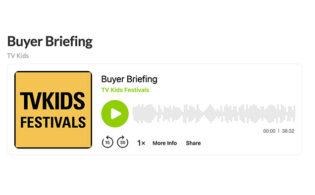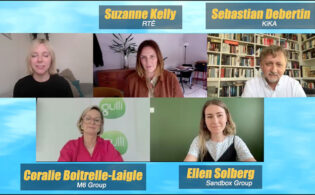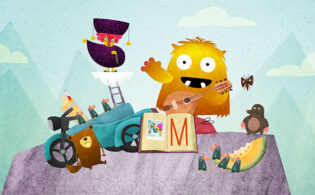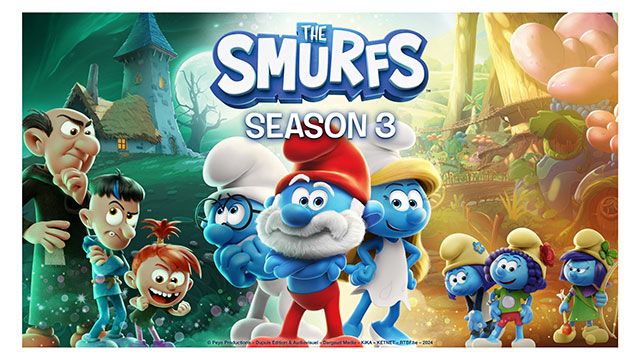Having been with KiKA since its inception, Sebastian Debertin has been instrumental in crafting a programming strategy that has evolved as the needs of children have over the last 25 years. The fundamentals of delivering a strong lineup of educational and entertaining fare haven’t changed. But the media ecosystem is radically different, and so are the challenges children are facing today. Debertin, the head of international content acquisitions, tells TV Kids about what’s resonating with KiKA’s audiences and outlines his wish lists for co-productions and acquisitions in the months ahead.
TV KIDS: What’s been resonating with your audiences over the last year?
DEBERTIN: Our programming in 2021 still was strongly influenced by the need to support kids’ lives [during Covid-19]. In 2020, we quickly adapted large parts of our programming to meet the changed needs of our audiences as children of all ages had to stay at home, being home-schooled for many, many months. We also immediately created appropriate campaigns, letting the kids know that we all are standing together in this crisis. And, besides all these measures of support, laughter and fun were needed too. From Robin Hood: Mischief in Sherwood to The New Adventures of Peter Pan, our audiences were fond of exciting new versions of classic stories—as the ratings show. The lively adaptation of Axel Scheffler’s beloved book series Pip and Posy made our youngest audiences’ eyes glance, thanks to ZDF! Last year, our partner WDR celebrated the 50th anniversary of Die Sendung mit der Maus. This true TV phenomenon has informed and entertained generations of viewers with a combination of animated stories and live-action explorations of how things work. While the knowledge-sharing and experiment-loving programs Checker Tobi and Checker Julian have resonated with older children, Baumhaus and Sandman [Unser Sandmännchen] have delighted our youngest with interactive fun and bedtime stories. KiKA co-productions like Dog Loves Books and Insectibles and WDR’s co-production Power Players have also done extremely well. ZDF’s Löwenzahn and Petronella Apfelmus remain favorites, too. In 2021, we also broadcast a highly anticipated new season of Schloss Einstein (ARD/MDR), our popular, long-running live-action series about a boarding school. [A new season of] Die Pfefferkörner (NDR), about a group of child detectives, premiered too. Besides many other premieres, there was also a new season of the Dutch series Floor Rules! (NDR), which surely brought a lot of much-needed laugh-out-loud moments to our viewers. We happily also received great feedback for our anti-racism comedy MOOOMENT!, which unpicks everyday situations and provides children with ways of recognizing and dealing with racism.
TV KIDS: Tell us about the approach to acquisitions. There’s so much content out there; what do you look for?
DEBERTIN: As a public broadcaster, we provide content for 3- to 13-year-olds that educates, informs and entertains. So we are looking for a variety of programs for the different age groups. It is important that children can both relate to the programs from their own experiences and are taken beyond them to see other children’s lives locally and across the world. While it is crucial for us to locally produce fiction and nonfiction programs to ensure our viewers can find themselves represented on-screen, we are excited to offer them co-productions and acquisitions from further afield. We are interested in fiction and nonfiction programs that are entertaining and informative, that bring joy to our viewers and promote values such as empathy, kindness, community, open-mindedness, diversity, inclusion, sustainability and creativity, without indulging stereotypes or merely ticking boxes. It is part of our mission to ensure that KiKA is a secure media space where children are considered for all that they are and where all are welcome. We offer content that takes children seriously.
TV KIDS: How much more complicated is the rights situation today?
DEBERTIN: The rights situation has always been complicated. A more recent hurdle for us is the German media law, which favors European productions, co-productions and especially acquisitions. For example, we cannot use acquisitions from outside of Europe for our nonlinear platforms—truly problematic on the way into a completely digital media world. The audience does not understand this limitation, which means we have to work on this.
TV KIDS: With the global streamers taking all rights, how has that impacted KiKA’s access to the best content?
DEBERTIN: The best approach here is not to fall into the trap of competing with them. Instead, we go on building our strong programs and brands as we have done for 25 years now, with the help of our shareholders and partners at ARD and ZDF, and through appropriate co-productions with local producers in Germany and Europe as well as worldwide.
TV KIDS: Tell us about the co-pros strategy.
DEBERTIN: Early involvement is key for ensuring that a project, for example, from another continent, will work for our audiences. At the same time, we also keep an eye on its international appeal. This makes co-productions successful—for us locally and our partners abroad. The result is that our co-pro partners will be interested in doing more shows with German co-pro partners, whether producers or broadcasters/content providers like KiKA, ARD or ZDF. I always feel truly satisfied when the shows work for our audience and pay off for our various co-producers internationally, too! Besides, co-productions are a great way of getting the most talented and skillful people to work together and create the best possible program.
TV KIDS: What are some of your original production initiatives for local content?
DEBERTIN: Since 2013, we have been part of Der besondere Kinderfilm, a funding model run by public broadcasters and the film industry, with state and regional funding. It supports the creation of films for children that are unique, closely reflect the lived experience of children today and contribute to the diversity of film offerings for the young. One of the most recent films to come out of this project is Träume sind wie wilde Tiger (Dreams Are Like Wild Tigers), which KiKA co-produced with NFP Media. It’s about a 12-year-old boy who, having just moved from Mumbai to Berlin with his family and facing difficulties in his new city, does everything he can to pursue his dream of succeeding at a Bollywood casting. This is an exciting, radiant film about belonging and unlikely friendships, with great dance moves, first premiering in German cinemas, and we can’t wait for it to come to KiKA. We also have long-running reality shows and documentary series that provide children with opportunities to share their perspectives. In Die Mädchen-WG, Die Jungs-WG and Die Mixed-WG, groups of teenagers from across Germany spend time living together in a new place (from Lake Garda to the Tyrolean mountains to Valencia), getting to know each other and solving tasks. In Schau in meine Welt!, children show the viewers how they live, their interests, hobbies and challenges in Germany and abroad. Formats like PUR+, Checkpoint, Wissen macht Ah!, Team Timster, logo! and Kummerkasten fuel our viewers’ curiosity about everything from everyday life to science, politics and media by asking scientific questions, experimenting and offering reliable and accessible information and emotional support. We also have successful game shows such as the popular quiz Die beste Klasse Deutschlands and music, dance and song competitions. MOOOMENT!, which I mentioned earlier, is another great example of local content, rooted in research conducted into children’s experiences of racism in Germany.
TV KIDS: What’s been the hardest gap to fill in your programming needs?
DEBERTIN: Shows that cleverly and intelligently address sensitive topics that resonate with our 8-plus audience and do not scare them away will continue to be the biggest challenge. Getting enough appropriate feature films can be difficult as we have three slots a week to fill. This is one reason we became an initiating partner of Der besondere Kinderfilm. We want to offer a broad mix, with animated features for the whole family and live-action feature films that transport sensitive issues appropriately for kids. Often, producers or distributors think a film about childhood is a film for children, which we don’t always find to be true! Furthermore, we are working on identifying successors for funny shows like The Garfield Show (from Mediatoon Distribution) for our after-school slot, which is a tricky but fun task!
TV KIDS: Are there any particular types of shows you’re looking for?
DEBERTIN: As you can see, we offer a broad variety of programs to make sure that everyone can find something that appeals to them and discover new things. We have game shows, science programs, cooking and crafting tips and other how-to content; documentaries about children’s lives, historical figures, festivities and places; dramas, sci-fi, fantasy, detective stories, horse adventures; sports series; and everyday school and home life comedies. We broadcast fiction, nonfiction, animated and live-action series, specials and features. In other words, we are always interested in programs across genres and topics that fit the criteria and values I outlined above. Everything that will interest children, affect them, concern them and fill them with enthusiasm is on our list—stories for children, about children, by children, with children. Stories that will touch hearts, open up worlds, invite them on fantastic journeys, widen horizons, have tangible connections with life, or are simply just fun like our co-pro The Smurfs! We are particularly looking for entertaining animated and live-action series for our afternoon slots. While we are quite well-covered in preschool programs, we still look at everything to find those gems we cannot miss out on, as we did lately with the Sixteen South animated series Odo or Zodiak Kids’ Mumfie. And finally, one of our biggest demands at the moment are animated and live-action feature films for a 6-plus and family audience.
TV KIDS: Do you foresee any shifts in your programming strategy in the next year?
DEBERTIN: Changes and shifts have always been part of our programming strategy—in the last three years as well as in the 22 years before. We want to stay close to the topics and experiences that matter to children in a constantly changing world.
TV KIDS: You’ve been with KiKA since day one. What are you most proud of as you reflect on the past 25 years?
DEBERTIN: In 25 years, a lot has happened, for sure, in our industry as well as at KiKA. I am proud that we are a market leader in German-speaking Europe while offering entertaining and educational programs. In contrast, others, who concentrated on pure entertainment and failed, are now copying KiKA. And yes, I am also very proud of having brought a lot of great shows and huge hits to KiKA that became big brands! Yakari, Fireman Sam, Guess How Much I Love You, Mouk, Tib & Tumtum, Chloe’s Closet, Super Wings, Care Bears, The Cat in the Hat, Franklin, Blinky Bill, Lily’s Driftwood Bay and many more. Of course, The Smurfs! I have the pleasure to be working with the best people in our industry as well as at ARD and ZDF. And I am proud of always being true to the most important audience in the world: kids. With kids’ media, we can enrich kids’ perspectives and understanding of the world to help them become strong and self-confident and to make responsible decisions for themselves and others. To me, that is a wonderful and absolutely rewarding thing!
 TVKIDS
TVKIDS






